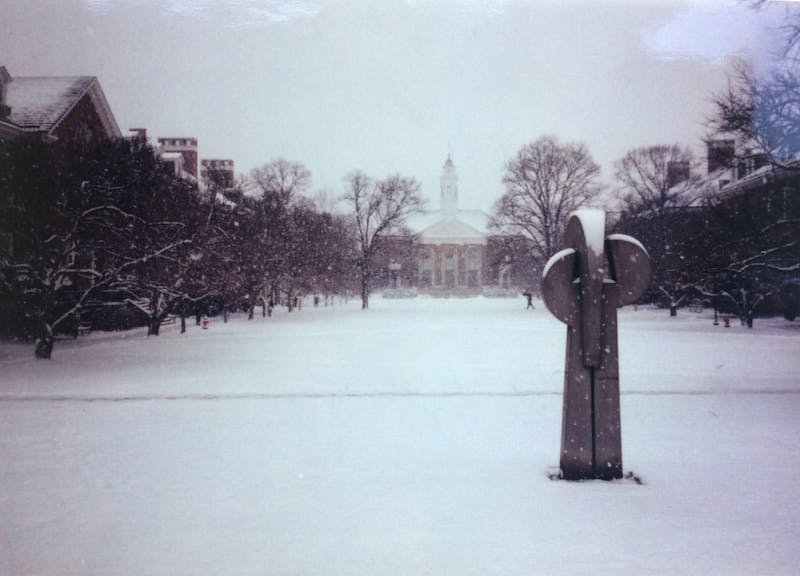

Joff Masukawa wrote for The News-Letter during his time at SAIS, from 1985 to 1987. Now he is an independent commercialization strategist who assists small, rare and speciality drug companies develop their business strategies as president and founder of Diligentia Strategy.
The News-Letter: How did you get your start at The News-Letter? Do you remember some articles that you wrote?
Joff Masukawa: I recall the urge to write pieces that were fun because, as most Hopkins students are, I was very focused on my academic studies. I was in the BA/MA program in SAIS, and during my first year in Washington, I profiled the top ten bars in Georgetown — a bar-hoppers’ guide that coincided with the release of the movie St. Elmo’s Fire. I also took pictures on my dad’s old Nikon, and those would occasionally appear in The News-Letter.
N-L: How did you spend your time outside of school?
JM: As an undergrad, I worked at the campus bookstore during the year and at the Formica Corporation during the summers thanks to my parents’ wonderful next-door neighbor, Jean, in Cincinnati. When I was at SAIS I worked for the Yomiuri Shimbun, a leading Japanese newspaper to support the D.C. correspondents, covering Capitol Hill hearings, gathering reports around town and providing summaries of key events. I was fortunate to gain a paid summer internship at Caisse Nationale de Crédit Agricole, a leading French bank, in the marketing department in Paris. I extend big thanks to my French professor at SAIS, who came up to me one day after class and said “Joff, would you like to go to Paris for the summer?”
N-L: How did you transition from completing the BA/MA program in SAIS to a career in the life sciences?
JM: I participated in the standard interviewing offered through SAIS, including banking and public relations, wanting to get a job in international business. I conducted my own search, too, interviewing at consumer product companies like Procter & Gamble and Quaker Oats and pharmaceutical companies. I made the decision to join the training program at Merck [& Co.], which at the time was the number one company to work for according to Fortune Magazine’s annual survey. There were 28,000 applicants that year; just 400 of us were invited to join. Apparently it was harder than getting into medical school, which having been an [international relations] major and avoiding any science classes during my time at Hopkins, was a bit ironic. Keep in mind there was no LinkedIn, no social networking. It was all about letter writing, phone calls and in-person networking. Having led the student career advising committee in partnership with the job placement office at Homewood, I was fortunate to learn these skills early on. My time at Merck set the course for my career.
N-L: What do you enjoy about your line of work? Do you have any observations to share about working in the life sciences industry during the pandemic?
JM: I’ve launched a lot of innovative products for deserving people with unmet medical needs and had tremendous fun and deep satisfaction pioneering the commercialization of first-in-class medicine and health technologies.I feel a deep commitment to ensuring these are accessible to patients and families who live with unyielding hope for life-changing treatments and cures... The industry’s response to COVID-19 has been remarkable, from developing tests and vaccines in record time to donating millions of dollars of PPE and other needed medical supplies to communities around the world. I hope that people now have a better flavor and perspective on what the industry is about as a result of what it achieved in the global fight [against] COVID-19.
N-L: What was the culture of The News-Letter like while you were a writer?
JM: It was supportive and open to new writers and photographers. I might have attended a News-Letter party or two.
N-L: What do you remember was the impact of The News-Letter on the Hopkins community?
JM: I looked forward to getting my copy every week! The News-Letter was one of the only ways to get comprehensive news since the internet was in its formative stages.
N-L: Have you kept up with any The News-Letter contacts after graduation?
JM: Sujata Massey, who was a reporter and subsequently has become a very successful award-winning mystery writer, and I are good friends.
N-L: Do you have advice for current undergraduates?
JM: Take full advantage of all the extracurricular activities that you can! Volunteer, explore. Live a rich experience as a student and let that set the foundation for your road ahead.